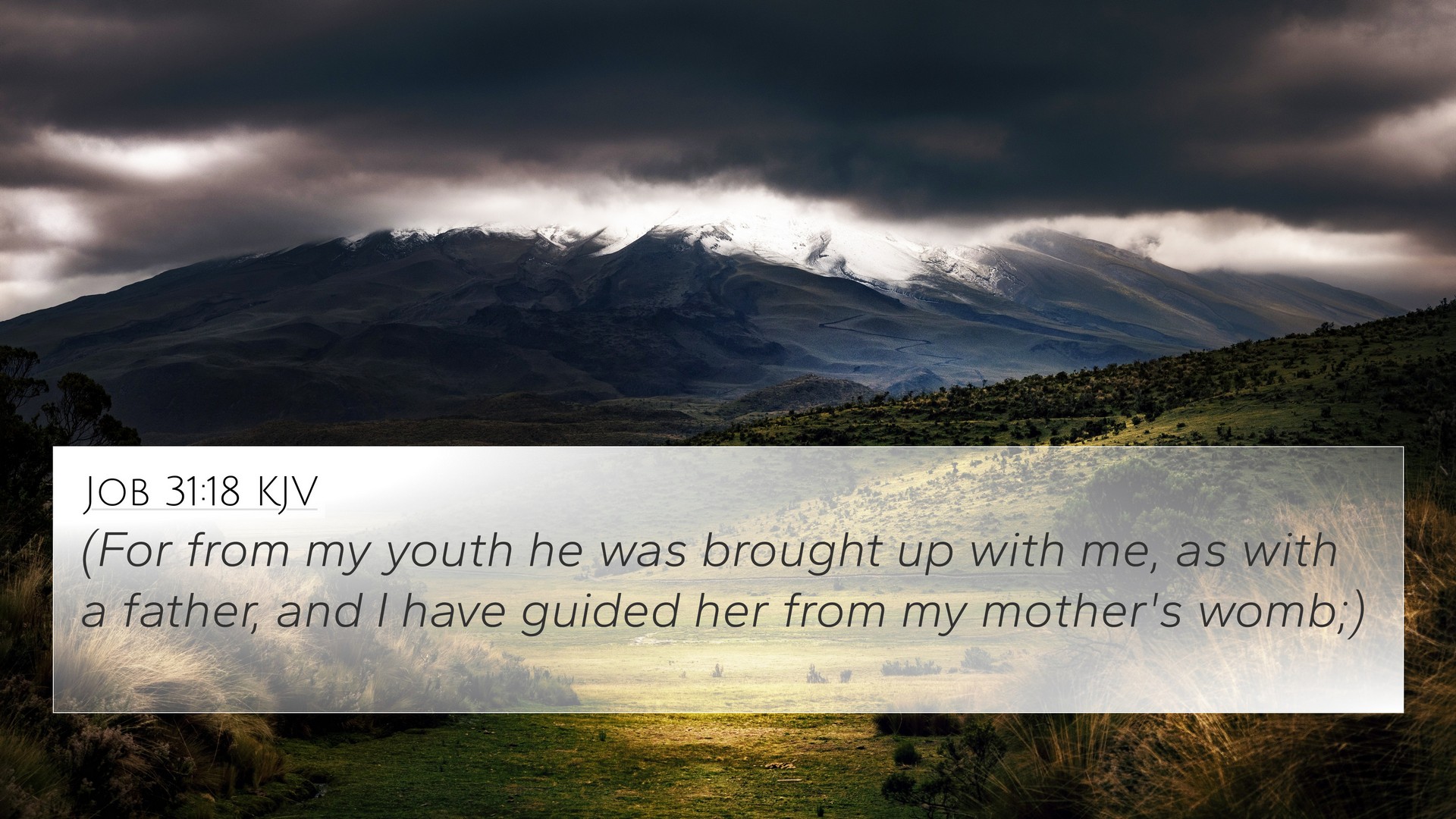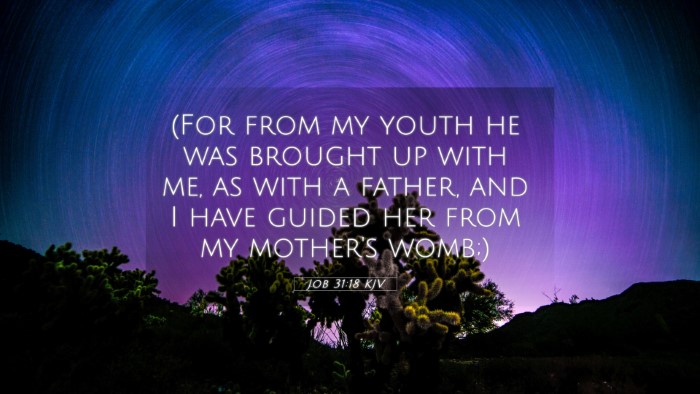Understanding Job 31:18: A Comprehensive Analysis
Job 31:18 states, "For from my youth, the fatherless grew up with me as with a father, and from my mother’s womb I guided the widow."
This verse encapsulates Job's commitments to righteousness and his moral obligations towards those who are vulnerable and marginalized in society.
In this comprehensive analysis, we will explore the meanings of this verse through insights from prominent public domain commentaries and its interconnections with other biblical texts.
Verse Meaning and Context
The backdrop of Job 31 is a passionate defense of Job’s integrity amidst the great suffering he endures.
Job asserts his social responsibilities, particularly towards orphans and widows, highlighting the moral imperative of providing care and support.
According to Matthew Henry, Job's remarks illustrate a sense of obligation towards the less fortunate, signifying that he treats them not merely as a duty but as a family.
Albert Barnes emphasizes the reciprocal nature of familial responsibility in his commentary, noting that Job's relationship with these vulnerable groups mirrors a fatherly bond.
Moral Implications
Job's self-reflection about his actions invokes a broader ethical consideration about how one ought to treat the marginalized in society.
Adam Clarke suggests that Job's assertion serves as a reminder of the social justice principles embedded in the Mosaic Law, which calls for the protection of orphans and widows.
Thematic Bible Verse Connections
Job 31:18 connects with several other biblical verses that reinforce the themes of compassion and social justice:
-
Exodus 22:22: "You shall not afflict any widow or fatherless child."
This verse emphasizes God's mandate for the community to protect and care for the vulnerable, mirroring Job’s sentiment.
-
Psalms 68:5: "A father of the fatherless, a defender of widows, is God in his holy habitation."
This highlights God's own protective nature towards the vulnerable, further linking to the call for human responsibility.
-
James 1:27: "Pure and undefiled religion before God and the Father is this: to visit orphans and widows in their trouble."
This New Testament verse underscores the continuity of caring for the fatherless and widows as a key aspect of true faith.
-
Proverbs 23:10-11: "Do not remove the ancient landmark, nor enter the fields of the fatherless; for their Redeemer is mighty; He will plead their cause against you."
This verse underscores the inherent value and protection of the fatherless, aligning with Job’s commitment to them.
-
Isaiah 1:17: "Learn to do good; seek justice, rebuke the oppressor; defend the fatherless, plead for the widow."
This verse encapsulates the call to action that Job embodies in his life.
-
Matthew 25:40: "And the King will answer and say to them, ‘Assuredly, I say to you, inasmuch as you did it to one of the least of these My brethren, you did it to Me.’"
A reinforcement of the idea that care for the marginalized is paramount in the economy of God's kingdom.
-
Luke 4:18: "The Spirit of the Lord is upon Me, because He has anointed Me to preach the gospel to the poor; He has sent Me to heal the brokenhearted, to proclaim liberty to the captives and recovery of sight to the blind, to set at liberty those who are oppressed."
This highlights the mission of Christ, aligning perfectly with Job's advocacy for the downtrodden.
Comparative Bible Verse Analysis
A comparative examination of the verses listed above reveals consistent biblical themes surrounding social justice and mercy.
The continual call to care for the fatherless and widow across both the Old and New Testaments underlines a seamless narrative advocating for compassion.
Job's life exemplifies these values as he, despite his tribulation, reflects on his societal responsibilities.
Cross-Referencing Biblical Texts
The act of cross-referencing these scriptures can greatly enhance understanding.
Tools for Bible cross-referencing, such as a Bible concordance or a cross-reference Bible study guide, can be useful in identifying these connections.
By utilizing a comprehensive Bible cross-reference material, one could uncover deeper themes linking these verses.
Conclusion
Job 31:18 serves as a profound reminder of one's moral obligation to the vulnerable, offering a call to action for all believers.
The interplay of this verse with others in the Bible enriches our understanding of God's heart for justice.
For those engaged in Bible study or sermon preparation, uncovering these inter-biblical dialogues will provide a robust foundation for teaching and application, highlighting the timeless relevance of caring for the fatherless and widows.


